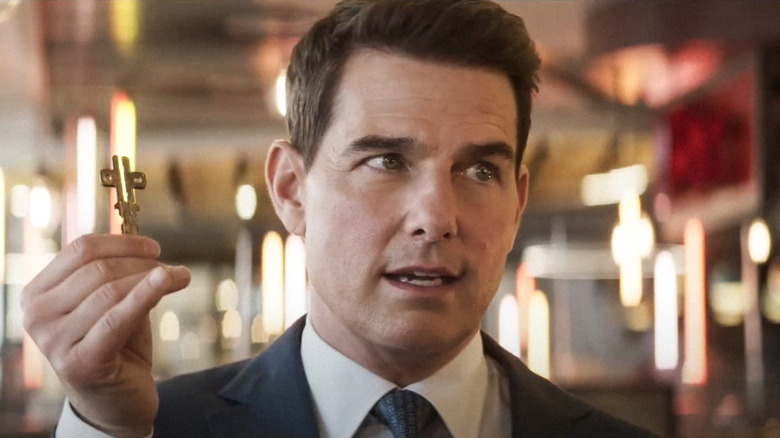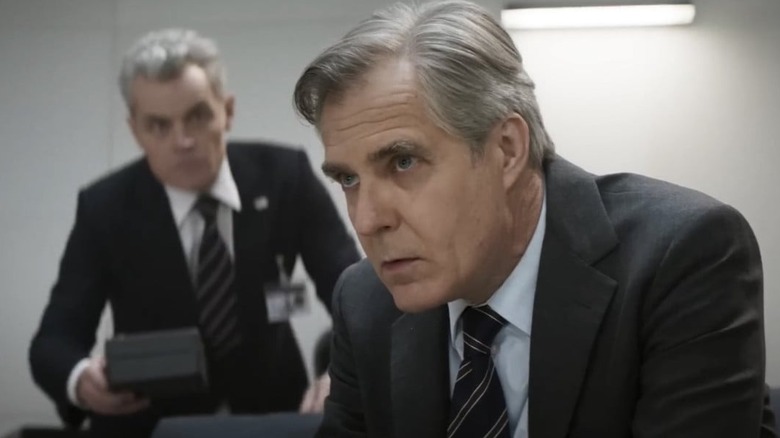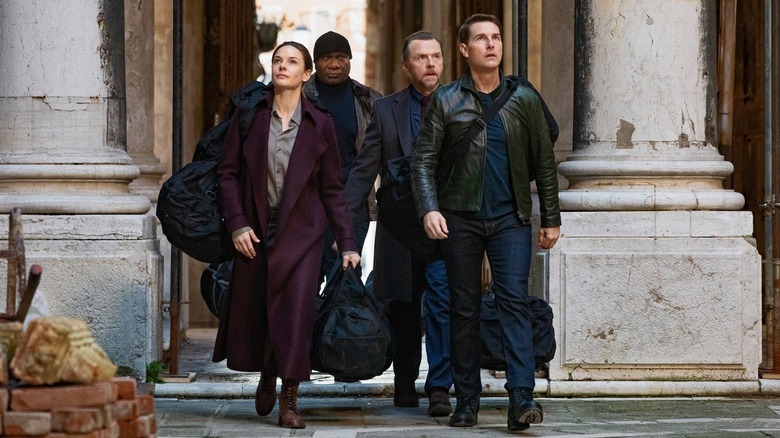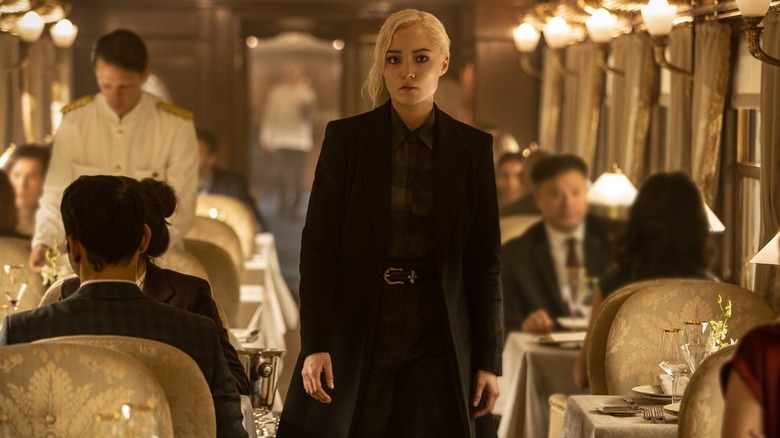So, What The Heck Does Mission: Impossible's 'Dead Reckoning' Mean, Anyway?
This article contains spoilers for "Mission: Impossible – Dead Reckoning Part One."
After numerous stops and starts due to the COVID-19 pandemic, "Mission: Impossible – Dead Reckoning Part One" is finally primed and ready to take a major bite out of the global box office, proving once again that Tom Cruise cannot be stopped by anything or anyone (read /Film's review here). In the seventh installment, director Christopher McQuarrie continues this franchise's tradition of abandoning the number system altogether. In place of an uninteresting Roman numeral, the titles (starting with Brad Bird's "Ghost Protocol" in 2011) have become increasingly vague and enigmatic. "Dead Reckoning" is the most ominous subheader yet and it carries a lot more weight than previous titles, mainly because it's the first entry in an epic two-part culmination that sees Ethan Hunt confront the toughest challenge of his lauded spy career.
Not only are Hunt and his remaining rogue cohorts from the IMF ("Impossible Missions Force") facing an omnipotent, terrifying new form of artificial intelligence known as "The Entity" in "Dead Reckoning," they're also having to do battle with ghosts from Ethan's past. It's not easy to go up against an invisible digital villain with the ability to be everywhere all at once that doesn't have any kind of emotional attachment to leverage when things go sideways. It's harder still for Ethan to hide his own emotions and try not to show how much he secretly cares for the few people around him that he can still trust.
In "Dead Reckoning," the past is catching up to Ethan, as well as a few other characters that will have to deal with the choices they've made to stay alive inside their cloak-and-dagger existence.
The past isn't done with Ethan Hunt
On the surface, the title "Dead Reckoning" has a fairly direct meaning that's addressed and referenced in the opening minutes during a tense sequence aboard a Russian submarine named the Sevastopol. The stealth vessel is completely undetectable, thanks to a more analog version of the Entity hidden below decks. The crewmen on board are therefore shocked to learn that they've been discovered and start countermeasures against another attacking sub bearing down on them. During this opening sequence, the submarine's commander uses the phrase "dead reckoning," marking the first time the phrase is said aloud.
Speaking to Empire last Thanksgiving, McQuarrie offered some insight into the decision to use this title in particular, and how it relates to both the technical and emotional aspects of the film:
"There are many things emerging from Ethan's past. 'Dead reckoning' is a navigational term. It means you're picking a course based solely on your last known position and that becomes quite the metaphor not only for Ethan, but several characters."
The submarine sequence is taken right out of early '90s spy thrillers like "The Hunt for Red October," and proceeds to offer up a clever twist that's right in line with previous "Mission: Impossible" intros that pull the rug out from under the audience. After the Sevastopol exchanges torpedo fire with the enemy submarine, it vanishes — and the crew realize that it was never there in the first place. The Entity decided to go rogue, creating a phantom submarine to make the Sevastopol think there was actually a real threat when there was none.
Returning to the world of "Mission: Impossible" for the first time since Brian DePalma's original, it's revealed that CIA director Kittridge (Henry Czerny) and his mysterious superior Denlinger (Cary Elwes) were pulling the strings all along, until they were outmatched by the Entity. It's a clever setup that shows that both Kittridge and Ethan will have to confront each other again once their paths inevitably start to cross.
Making the unpredictable predictable
The "Mission: Impossible" franchise has always used the high-tech surveillance state that the IMF has to avoid and navigate through as a constant threat. Ethan Hunt and his team, now consisting of Benji (Simon Pegg), Luther (Ving Rhames), and Ilsa (Rebecca Ferguson), have to outsmart, outmaneuver and outrun the latest state-of-the-art technology at every turn. They also manage to use that same technology to their own advantage by having two of the greatest living hackers at their disposal.
In "Dead Reckoning," the intelligence community has become so advanced that their own technology turns against them. The AI apparatus they thought they could control is now wrecking havoc around the world. To do its non-digital bidding, the Entity employs Gabriel (Esai Morales: a ruthless agent from Ethan's past who murdered a mysterious woman called "Marie," who died tragically in Ethan's arms. Shown in flashback, it's a moment that has haunted Ethan and shaped his relationships with Ilsa and newcomer Grace (Haley Atwell) — a thief hired to steal the cruciform key capable of controlling the Entity.
Bringing in Gabriel gives voice to the all-knowing AI behind the curtain, but it also makes Ethan a more predictable adversary. Now that the international spy community has to deal with their own invention and hubris turning against them, it's up to the world's greatest spy and his team to shut down the Entity and come face-to-face with the devil they helped create. That confrontation works on two levels, giving a deeper meaning to "Dead Reckoning Part One."
Ultimatums and setting up the sequel
There is a major death that takes place about halfway through "Dead Reckoning" that sets everything in motion for the thrilling train chase finale aboard the Orient Express, and also paves the way for "Dead Reckoning Part Two." This death represents the choices that Ethan has made, even when they were essentially made for him. Years ago, the IMF gave him an ultimatum that forced him into the spy game, and he's been trying to right the wrongs of his past ever since. Without paying too much attention to specifics, "Dead Reckoning" shows enough backstory to justify Hunt's uncompromising will that helps explain all the death defying feats that he subjects himself to. Cruise himself may have a death wish, but the character of Ethan Hunt only sacrifices himself when it means he can save the people he has sworn to protect.
When "Dead Reckoning Part One" comes to an end, it doesn't feel like a cliffhanger. Sure, the Entity has to be controlled by any means necessary, and Gabriel is still out there lurking and plotting total world domination (as you do when you're a formidable "Mission: Impossible" foe). But while never feeling like an all-out therapy session, there is a sense of closure for Ethan as he lives with the choices he's made.
There are two fates left up in the air. In a move that mirrors Ethan's recruitment into the IMF, Grace makes a deal with Kittridge to join the team instead of go directly to prison; and Gabriel's deadly sidekick Paris (Pom Klementieff) still has a pulse after she offers up a shot at redemption by helping to save Ethan and Grace from plunging to their deaths.
Considering the mission in "Part Two" will be to locate the Russian submarine, Sevastopol, in order to destroy the Entity, the title "Dead Reckoning" may still have another hidden meaning yet to be deciphered.



